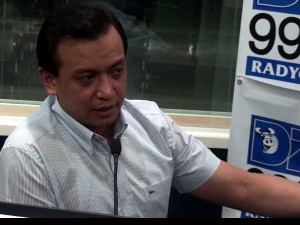MANILA, Philippines—A confessed backroom negotiator, former National Security Adviser and Director General of the National Security Council Jose Almonte called the back-channeling role “a privilege,” but with responsibilities attached to it.
“There are requirements,” Almonte said. “You act as a secret messenger and the negotiations should be held as a state secret. Under no circumstances should it be revealed. Only certain people must be allowed to know about it and agencies like the Department of Foreign Affairs must not be compromised.”
Reached by the Inquirer for comment, experts weighed in on the recent word war between Senate President Juan Ponce Enrile and Sen. Antonio Trillanes IV and the latter’s role in the Panatag Shoal dispute with China.
After tangling with Trillanes over a bill dividing Camarines Sur on Wednesday, Enrile read Ambassador to China Sonia Brady’s diplomatic notes that suggested Trillanes was working to advance China’s interest, and was undermining the Philippine position on the dispute.
Trillanes, who was reportedly approached by Chinese officials to serve as back-channel negotiator, volunteered to help defuse the standoff between Philippine and Chinese vessels at the shoal in April, Palace officials said.
President Aquino on Friday acknowledged the senator’s contribution to the deescalation of tensions at the shoal, saying that he opened a channel of communication with Chinese officials.
People involved in such back-channeling negotiations, Almonte added, “must ensure that they should work for the highest interest of the state.”
Retired Commodore Carlos Agustin, president of the Maritime League and member of an expert panel that recently released a policy paper on the West Philippine Sea, said the Enrile-Trillanes exchange was “uncalled for,” adding that the whole matter about the Camarines Sur division should have been discussed in an executive session.
Personal issue
“It became a personal issue, and can be perceived as the best example of Senate leadership gone haywire. I thought that Enrile’s claiming expertise in national security was non sequitur. The national interest has been prejudiced because of personal egos. A good national security practitioner should have taken it up in closed session,” Agustin said.
He also said it was unfortunate that Foreign Secretary Albert del Rosario had been dragged into the issue. He said Del Rosario is “a diplomat par excellence who enjoys great support from the international community as well as his department.”
If what Trillanes pointed out was true, Agustin said the senator “almost scored” during the Panatag Shoal standoff.
“Except that the instruction to the Chinese ships and boats took too long to filter down, as we can expect from an over-centralized structure where all lower officials are afraid to make a mistake. I now understand why, at that time, President Aquino was saying that the Chinese did not keep their word,” Agustin added.
Errors of judgment
Antonio G.M. La Viña, dean of Ateneo School of Governance, said Trillanes might have committed errors of judgment.
“But to say that he’s a traitor, I think, is too much. I really hope our senators do not call each other those kinds of names because it’s not good for the Senate. It’s not good for the country,” said La Viña.
La Viña said he found nothing wrong with back-channeling, but only if it promotes “the same interest.”
“There is nothing wrong with back-channeling. But now, from what we are seeing, the back-channel negotiator is saying something completely different from the official line. That makes it problematic,” La Viña said.
“That means the country is not speaking in one voice. Back-channeling is okay if you’re speaking in the same voice. The back channel just reinforces or says it maybe in a nicer way, in a different way but at least it’s the same voice. It’s the same interest. If not, then it’s not a useful back-channeling, as far as I’m concerned,” La Viña added.
Typical soap opera
Scott Harrison, founder and managing director of the think tank Pacific Strategies and Assessments, called the word war between the legislators as “a typical soap opera in the Senate.”
“The President of the Philippines has every right to pick whomever he wants as a special emissary to a foreign country,” said Harrison, whose company supplies intelligence information and risk-assessment reports to some of the world’s top corporations and foreign embassies in Manila, including the United States. “Presidents from all over the world do that on a regular basis.”
On Enrile’s disclosure of Brady’s purported notes of her meeting with Trillanes on the disputed Panatag Shoal, Prof. Harry Roque said it may have “compromised” national interest.
By disclosing the Brady notes, Enrile also bared the extent of Trillanes’ involvement in backroom negotiations with China over the shoal in the West Philippine Sea, and the latter’s position on the territorial dispute, said Roque, director of the UP Law Center’s Institute of International Legal Studies.
‘Absolutely confidential’
“The extent of involvement of Trillanes should have remained confidential. There were also details on the position taken by Trillanes, and the words he allegedly said. Those are absolutely confidential,” he said.
The law professor said this was tantamount to revealing a state secret, a violation not covered by parliamentary immunity.
Like poker
“We can’t show our weak points to the other party. Diplomacy is like poker. Why show your cards to the other party? You may have disagreement with your colleagues, but you should distinguish between an internal dispute and national interest,” he said. “The Chinese don’t need spies if our government officials declassify secret documents.”
The notes were presumed to be regular and authentic since these were received as official communication by the Senate president, Roque said.
Former Solicitor General Frank Chavez, however, offered a different view.
“If you base it on what was disclosed, there was nothing explosive,” he said. “Those are notes taken by a government functionary for future use if there is any disavowal of any matter being discussed. I see nothing that would breach national security there.” TJ Burgonio, and Schatzi Quodala, Almi M. Ilagan and Mary Beatrice Ponce, Inquirer Research
